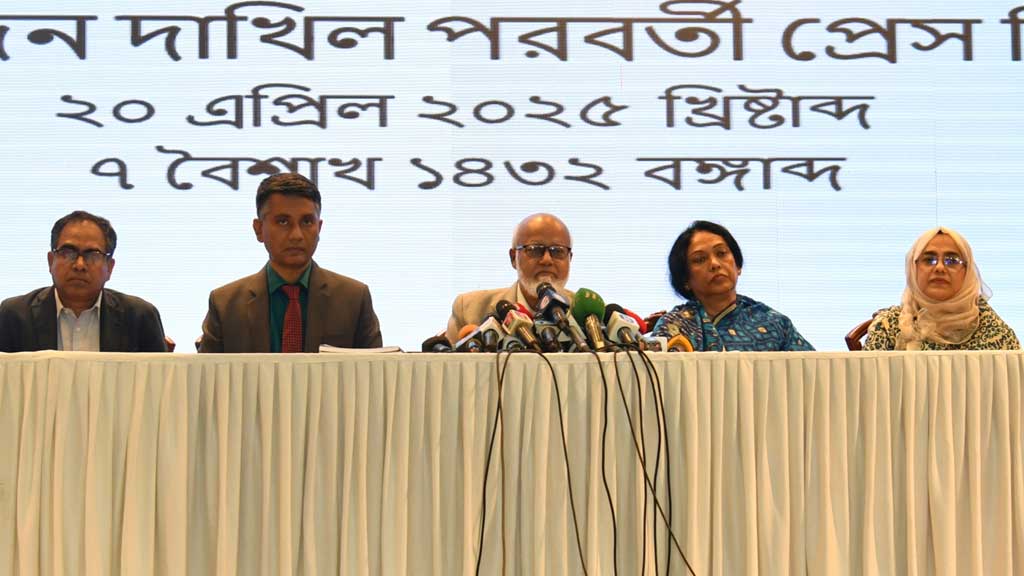Home
+
The reform commission’s report also recommends changes in finance, staffing, and judicial powers of local bodies

Published : 21 Apr 2025, 12:35 AM
The Local Government Reform Commission has proposed sweeping changes to strengthen Bangladesh’s local government system, calling for a shift in electoral structures, revenue policy, and administrative responsibilities.
One key recommendation is to abolish the post of chairman at union and Upazila levels, replacing it with councils composed of elected members.
The commission, headed by Tofail Ahmed, handed over its final two-part report to Chief Advisor Muhammad Yunus on Sunday afternoon.
Later in the evening, around 6:30pm, the commission’s members held a press conference at the Foreign Service Academy to outline their proposals.
“Local government is the oldest form of state,” Tofail said. “Since British rule, its structure has been imposed top-down and remains under the control of the deputy commissioner’s office.
“The current system needs a radical change. We have called for a democratic transformation at the union, Upazila, and district levels."
According to the commission chief, current systems concentrate most of the power in the hands of elected chairmen, leaving members with little authority.
“We have proposed abolishing the chairman post in elections. The elected members will choose their council head."
“A smaller, more focused council will be formed,” he added. “This will allow all elected representatives to play a role in local governance, preventing power from being concentrated in the hands of one individual.”
Tofail also suggested similar changes for municipal and city corporations. “At present, local government operates under five fundamental laws. We propose a unified law with supporting regulations.”
He highlighted inefficiencies in the current electoral process. “From 2021 to 2024, it took 225 days to complete a local election cycle. That can be brought down to 40 days. The last elections cost Tk 23 billion—this can be significantly reduced.”
On funding, the commission advised increasing local government’s share of national resources. “A major portion of local government funding must come from the central government. Currently, less than 0.5 percent of the national budget is spent on local government — this must increase. People pay taxes to the central government as well,” said Tofail.
The commission chief suggested that one-third of the value-added tax (VAT) should be allocated to local governments and added that spending must be monitored closely.
The commission has also proposed a revised distribution of public workforce responsibilities.
Tofail said: “Right now, the same duties are assigned to both central and local governments. But local authorities don’t receive budgets, only responsibilities.
“Union, Upazila and district-level government staff salaries should be funded by local governments, with allocations from the central government,” Tofail said.
He explained that there are 17 government departments in each Upazila and officials from seven ministries in each union, but “no activity, no work, and no budgets”.
The commission calls for reactivating these local units and recommends building a full-scale hospital in each union with three doctors.
“At Upazila health complexes, there should be 12 doctors, but they are not there. If the government cannot manage this, let it be privatised,” Tofail added.
On judicial reforms, the commission called for full-fledged civil and criminal courts at the Upazila level
“This is not a new idea — it has been practised before. Misuse of village courts has forced people back to traditional arbitration,” the report reads.
The commission recommended dissolving village courts and establishing Alternative Dispute Resolution (ADR) centres at Upazilas.
“There’s no need to run justice through the executive branch. The practice of holding courts inside police stations in the name of arbitration must stop.”
To streamline staffing and wages, the commission proposes a new recruitment policy for local government.
“The government should pay 70 percent, local government 30 percent of the salaries. Village and town police units should be formed,” the report says.
Tofail said: “We’ve advised implementing local government systems in the Chittagong Hill Tracts as well.
“District council elections must be introduced there. VAT and tax exemptions for government projects in the region should be revoked,” he concluded.